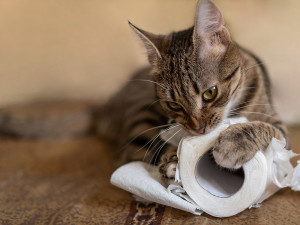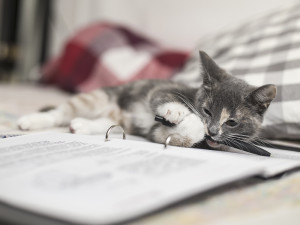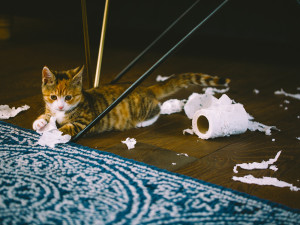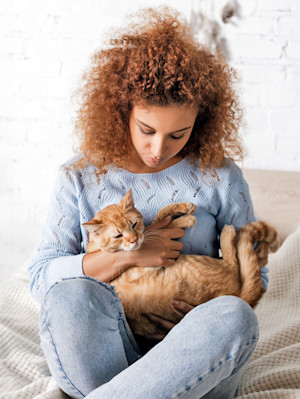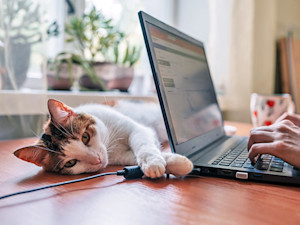Why Does Your Cat Lick Plastic?
That’s an interesting choice for a snack...

Share Article
In This Article:
Why Does My Cat Lick Plastic Bags?opens in a new tab Reasons Why Cats Lick Plasticopens in a new tab Why Does My Cat Chew Plastic?opens in a new tab
Have you noticed your cat seems obsessed with licking plastic — especially plastic bags? This is very common in the feline world. But why? What is it about plastic that interest our cats — whether they’re licking or chewing on it? Some of the triggers may surprise you.

Get (totally free) deals for food, treats, accessories, tech, and way more pet parenting must-haves.
opens in a new tabWhy does my cat lick plastic bags?
It’s a question I get all the time from clients. And I see it in my own cats. Why are they always licking plastic bags, (like those from the grocery store) and other plastic items?
Believe it or not, there are many potential reasons for this odd behavior. Some are innocent enough. Cats are curious creatures, always on the lookout for entertainment. Other triggers mean you need to step in. Your cat could be licking and chewing plastic as a sign of stress, or even a medical issue.
Just because it can be licked, doesn’t mean it should. It’s just as important to pay attention to what your cat is licking and chewing, as it is why.
Reasons why cats lick plastic
Let’s dive into some of the reasons cats lick plastic items and when you might need to take action.
Texture
Cats use their senses to explore their environment. This includes their oral senses to pick up taste, temperature, and texture. Much like babies, cats put things in their mouths to investigate them. They may end up enjoying the texture, keeping them coming back for more.
Pica
Pica is a disorderopens in a new tab, found in people and some animals, causing them to eat non-food itemsopens in a new tab. This is not the same as licking non-food items. Cats with pica are actually ingesting things that have no nutritional value.
There are a variety of causes, from stress to nutritional deficiencies to medical conditions. It can be quite dangerous, which we’ll talk about more in a later section.
Just because your cat managed to eat something doesn’t mean they have pica. Your cat’s tongue is covered in tiny barbs that point back toward the throat. Sometimes, things get caught in those barbs and worked back into the throat where they’re swallowed. Your cat may not have intentionally swallowed the item but was unable to spit it out. So, if it happens on a rare occasion, you probably don’t need to worry about pica. Just mention it to your vet.
Interest in the smell or taste
Think about the taste and smell that comes from plastic items, like grocery bags or food containers. Your cat may be drawn to the left-over scent of food or any number of smells that linger in the plastic.
It’s not just what was in the plastic, but what it’s made of. You never know what chemicals and substances are used in the manufacturing process. For example, plastic bags are often coated in slip agents made from animal fats. This helps keep them from sticking together, but also likely attracts our cats.
Boredom
A bored cat will look for anything to occupy their time. And playing with a plastic bag or container is a good time. What cat doesn’t like to hop in an empty box or crawl in an empty bag. That’s why it’s a good idea to cut or remove the handles from plastic bags, so your cat can’t get them caught around their neck.
Anxiety
Nerves may cause us to bite our nails. Your anxious catopens in a new tab may choose to lick or chew plastic (or other materials). It can be a way of trying to self-soothe, though it’s not very healthy. If that anxiety is left untreated, it can get worse, even leading to compulsive behaviors.
Compulsive behaviors
Cats can experience obsessive-compulsive behaviorsopens in a new tab, just like people do. It’s commonly seen as over-grooming or biting at an area of their body. Some cats will suckle fabric compulsively. But cats can also compulsively lick, chew, or (as with pica) eat things as a way of expressing that anxious energy. In this case, you may have a hard time interrupting and distracting them. It’s as if they “need” to lick or chew. Stress reduction is important here.
High-energy cat breeds
This goes right along with boredom. High energy cats need more to keep them occupied. Playing with and investigating plastic bags, boxes, and other items can be a form of entertainment.
Hunger
A hungry cat opens in a new tabwill look for food anywhere they can smell it. If there’s a lingering odor from groceries, take out, or your work lunch, your cat is going to check it out.
Medical issues
Licking plastic can be triggered by medical issuesopens in a new tab. For example, cats experiencing nutritional deficiencies will sometimes lick non-food items. In fact, I had both a cat and a dog licking unusual items (at different times in their lives). I notified my vet, they ran tests and uncovered medical issues. That’s why it’s important to mention any unusual behavior to your vet, even if you think it’s no big deal.
Why does my cat chew plastic?
The reasons for chewing plastic are the same as licking plastic. Things like boredom, stress, hunger, and being attracted to the smell, taste, and texture can prompt your cat to chew plasticopens in a new tab.
Potential dangers of chewing plastic
Both chewing and licking plastic opens in a new tab(or any non-food item) can be extremely dangerous. It’s vital to pay attention to what your cat is licking or chewing. This is a situation where I follow the “better safe than sorry” rule!
Choking hazard
Cats can absolutely choke on things. Even products made for cats, like certain toys, can have choking hazards. If you know your cat likes to chew, check their toys for parts that could come detached when chewed. Get rid of the toy all together or cut those parts off.
Getting it wedged in the mouth
Depending on the size and shape of the plastic, your cat could get it wedged in their jaw. Not only can this be painful and cause panic, it means they can’t eat or drink. If you’re not going to be home for a while, all of these can be serious problems.
Oral or intestinal puncture
Your cat could be chewing something with sharp edges, or they could break the plastic item into smaller bits with sharp edges. These can get stuck in the tongue or soft pallet. If they swallow it, they’re at risk of puncturing the stomach or intestines, which is a medical emergency.
Chemical ingestion
This goes for licking and chewing. We don’t know what chemicals or ingredients are used on various types of plastic. There’s no guarantee they’re safe for cats. Licking, chewing, or swallowing plastic that includes toxic ingredients is dangerous.
It may not be an ingredient in the plastic — but what was stored in it. You wouldn’t want your cat licking a plastic bag that your bug spray or rat bait came in, for example. Even seemingly safe things, like onionsopens in a new tab, garlicopens in a new tab, or the pollen from liliesopens in a new tab, are toxic to cats.
Intestinal blockage
Anything that can’t be digested can cause an intestinal blockageopens in a new tab. This is another medical emergency. If your cat is straining to poop or hasn’t pooped in a day or two, call your vet right away.
Bacteria consumption
We talked about chemicals and materials that can be unsafe. Plastic items can also carry bacteria, whether it’s from something that was in the container, its natural process of breaking down, or the area it was found. Again, you just never know.
When to seek expert help
If you have any reason to believe your cat has licked, chewed, or swallowed something dangerous, don’t wait around. Call or see your vet right away. They can do x-rays and feel for blockages, check the mouth and throat, run tests to see if any toxins were ingested, etc.
You can also call one of the pet-poison hotlines if you think they may have gotten into something toxic.
If your cat is showing signs of anxiety that could be causing their licking or chewing of plastic, or it’s hard to distract them when they’re doing it, consider working with a feline behavior consultant. They can look for possible triggers and develop a plan to help reduce stress, build confidence, and more.
Bottom line
Cats lick and chew plastic for a variety of reasons. Some come from their natural curiosity, using the sensory receptors in their mouths to explore and entertain. Some can be a red flag letting you know your cat is feeling anxious or dealing with a medical issue. It’s very important to monitor your cat’s licking and chewing to make sure they’re not ingesting anything dangerous.
References
Plummer, Joseph M. “Why Does My Cat Lick Plastic Bags? Is It Safe? How to Stop?” FVEAP, 3 July 2023, www.fveap.org/why-does-my-cat-lick-plastic-bags/opens in a new tab. Accessed 26 Mar. 2025.

LeeAnna Buis, CFTBS, FFCP
LeeAnna Buis has adored cats her entire life and thought she knew them inside-out and sideways. But it wasn’t until she worked with a feline behavior consultant that she fully understood how incredible, complicated, and inspiring cats really are.
LeeAnna earned her certification through Animal Behavior Institute, earning the CFTBS designation. She is a certified Fear Free trainer, a training professional member of the Pet Professional Guild (PPG), and a member of both the International Association of Animal Behavior Consultants (IAABC) and Cat Writer’s Association (CWA).
Related articles
![A calico tabby kitten chewing and tearing a roll of toilet tissue.]() opens in a new tab
opens in a new tabWhy Does My Cat Chew On Everything?
How to decode your cat’s chewing habits when they’re nibbling on all the things.
- opens in a new tab
Why Does My Cat Lick My Face?
It’s sweet, but a little much.
![Woman holding her orange cat in her arms in bed.]() opens in a new tab
opens in a new tabTop 6 Most Common Reasons Why Your Cat Is Eating Litter
It’s not only gross — it’s probably a sign that something is not quite right in your kitty's kingdom.
- opens in a new tab
Why Does Your Cat Lick Your Hair?
And should you let them?
- opens in a new tab
6 Common Reasons Why Kittens Suck on Blankets
This totally cute kitty behavior is OK, right?
![Cat laying on a laptop cord on the desk at home.]() opens in a new tab
opens in a new tabIs Your Cat Chewing Cords? Here’s What to Do About It
They love to push boundaries, but let’s nip this one in the bud.
